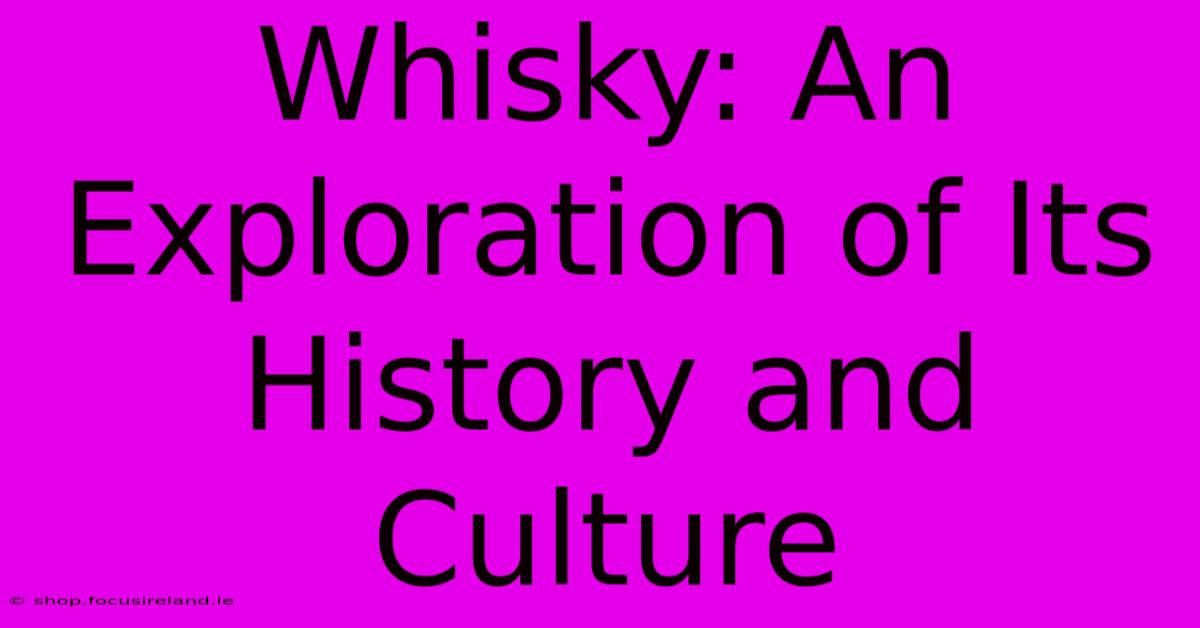Whisky: An Exploration Of Its History And Culture

Table of Contents
Whisky: An Exploration of Its History and Culture
Whisky, a spirit revered for its complex flavors and rich history, holds a special place in the hearts (and glasses) of millions worldwide. From the rugged landscapes of Scotland to the sun-drenched fields of Japan, its production and appreciation transcend geographical boundaries, weaving a tapestry of culture and tradition. This exploration delves into the fascinating world of whisky, examining its origins, diverse styles, and enduring cultural significance.
A Toast to History: The Origins of Whisky
The precise origins of whisky remain shrouded in some mystery, but most historians point to Ireland and Scotland as its birthplace, sometime in the early Middle Ages. Early forms of whisky were likely simple distillations of fermented grain, far removed from the refined spirits we enjoy today. Monks, it is believed, played a significant role in refining distillation techniques, initially for medicinal purposes.
From Monasteries to Mass Production:
The 15th and 16th centuries witnessed a gradual shift, with whisky production moving beyond monastic confines and into the wider community. Scotland, in particular, embraced whisky production, adapting it to its unique environment and cultivating a distinct national identity intertwined with the spirit. However, this growth was often unregulated, leading to periods of both prosperity and prohibition.
Exploring the Diverse World of Whisky Styles
The world of whisky is remarkably diverse. Different regions, grains, and production methods yield spirits with unique characteristics. Here are some prominent examples:
Scotch Whisky:
Undeniably the most famous, Scotch whisky is defined by its production in Scotland, utilizing malted barley and aging in oak casks. Several categories exist, including:
- Single Malt: Made from malted barley at a single distillery.
- Single Grain: Made from malted and unmalted grains at a single distillery.
- Blended Scotch: A blend of single malts and single grains.
Each category displays a broad range of flavor profiles, depending on the distillery's location, production methods, and cask type used for aging. Highland, Islay, Speyside, and Lowland Scotch whiskies are notable examples, each with its own distinct character.
Irish Whiskey:
Irish whiskey often boasts a smoother, lighter profile compared to Scotch. Typically triple-distilled, it's often made with a blend of malted and unmalted barley, contributing to its smoother finish.
Japanese Whisky:
A relative newcomer to the global scene, Japanese whisky has rapidly gained recognition for its exceptional quality and refined techniques. Often drawing inspiration from Scotch whisky-making traditions, Japanese distilleries produce elegant and nuanced spirits.
American Whiskey:
This broad category encompasses several distinct styles, including bourbon (made primarily from corn), rye (made primarily from rye grain), and Tennessee whiskey (a type of bourbon filtered through charcoal). American whiskeys generally exhibit bolder, spicier profiles.
Whisky Culture: Beyond the Bottle
The appreciation of whisky extends far beyond the simple act of drinking. It's embedded in cultural practices and social rituals around the globe.
Whisky Festivals and Tastings:
Whisky festivals and tastings offer opportunities to explore a wide range of whiskies, learn about their production, and engage with other enthusiasts. These events often feature master classes, distillery tours, and opportunities to meet distillers and experts.
Whisky Clubs and Communities:
Numerous whisky clubs and online communities foster a sense of camaraderie among whisky aficionados, creating platforms for sharing knowledge, tasting notes, and experiences.
The Ritual of Whisky Appreciation:
The proper way to enjoy whisky often involves a careful appreciation of its aromas, flavors, and finish. Taking the time to savor each sip enhances the experience, transforming the simple act of drinking into a mindful ritual.
The Enduring Appeal of Whisky
The enduring appeal of whisky lies in its complex interplay of history, tradition, and craftsmanship. Each bottle tells a story, reflecting the unique terroir, distillation methods, and aging processes involved in its creation. As we raise a glass to this remarkable spirit, we celebrate not only its exquisite flavors but also its rich cultural heritage. The journey of discovery in the world of whisky is a continuous one, offering endless opportunities for exploration and appreciation.

Thank you for visiting our website wich cover about Whisky: An Exploration Of Its History And Culture. We hope the information provided has been useful to you. Feel free to contact us if you have any questions or need further assistance. See you next time and dont miss to bookmark.
Featured Posts
-
Dog Friendly B And Bs In Kerry Bring Your Furry Friend
Mar 26, 2025
-
Escape To Ireland Ferry From Glasgow
Mar 26, 2025
-
Ireland Packing Dont Forget These Important Items
Mar 26, 2025
-
Historic Maynooth B And B With Character
Mar 26, 2025
-
The Comfort Of Rail Scotland To Ireland
Mar 26, 2025
